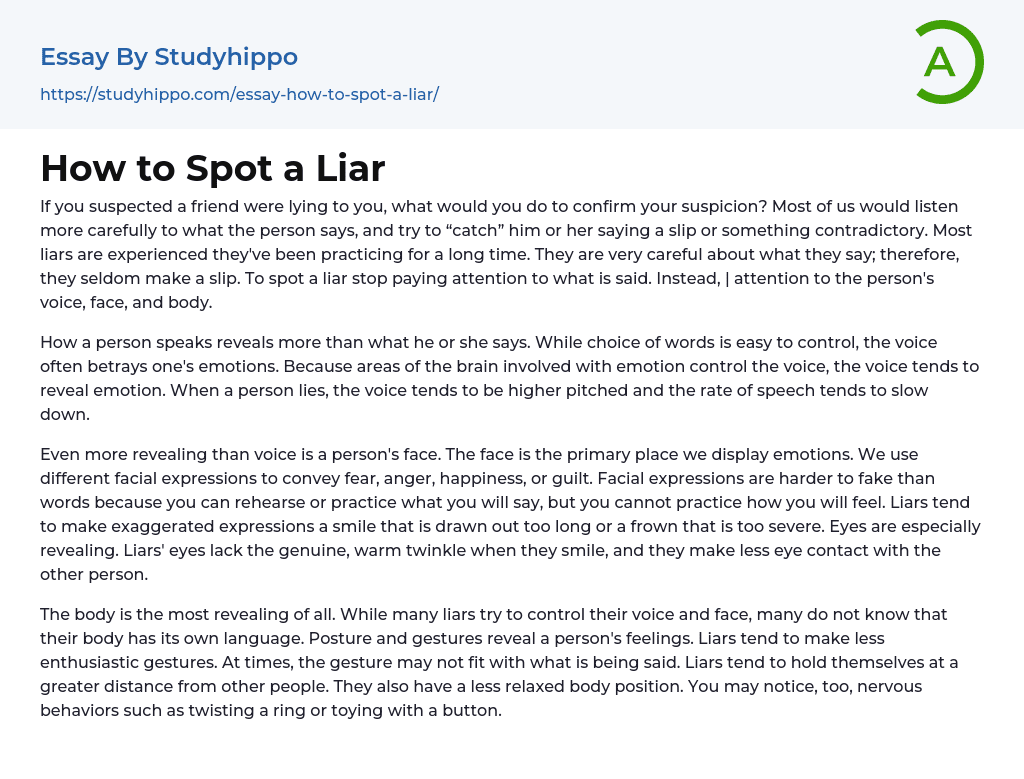If you suspected a friend were lying to you, what would you do to confirm your suspicion? Most of us would listen more carefully to what the person says, and try to “catch” him or her saying a slip or something contradictory. Most liars are experienced they've been practicing for a long time. They are very careful about what they say; therefore, they seldom make a slip. To spot a liar stop paying attention to what is said. Instead, | attention to the person's voice, face, and body.
How a person speaks reveals more than what he or she says. While choice of words is easy to control, the voice often betrays one's emotions. Because areas of the brain involved with emotion control the voice, the voice tends to reveal emotion. When a person lies, the
...voice tends to be higher pitched and the rate of speech tends to slow down.
Even more revealing than voice is a person's face. The face is the primary place we display emotions. We use different facial expressions to convey fear, anger, happiness, or guilt. Facial expressions are harder to fake than words because you can rehearse or practice what you will say, but you cannot practice how you will feel. Liars tend to make exaggerated expressions a smile that is drawn out too long or a frown that is too severe. Eyes are especially revealing. Liars' eyes lack the genuine, warm twinkle when they smile, and they make less eye contact with the other person.
The body is the most revealing of all. While many liars try to control their voice and face,
many do not know that their body has its own language. Posture and gestures reveal a person's feelings. Liars tend to make less enthusiastic gestures. At times, the gesture may not fit with what is being said. Liars tend to hold themselves at a greater distance from other people. They also have a less relaxed body position. You may notice, too, nervous behaviors such as twisting a ring or toying with a button.
- Child essays
- Childcare essays
- Child labor essays
- Doll essays
- Abnormal Psychology essays
- Social Psychology essays
- Developmental Psychology essays
- Jean Piaget essays
- Positive Psychology essays
- Classical Conditioning essays
- Counseling essays
- Psychoanalysis essays
- Educational Psychology essays
- Behaviorism essays
- Authority essays
- Operant Conditioning essays
- Maslow's Hierarchy Of Needs essays
- Mental Health essays
- Personality Psychology essays
- Psychotherapy essays
- Family Therapy essays
- Stanford Prison Experiment essays
- Abraham Maslow essays
- Erik Erikson essays
- Cognitive Psychology essays
- Sigmund Freud essays
- Attachment Theory essays
- Supersize Me essays
- Individual essays
- Infant essays
- Childhood essays
- Adolescence essays
- Growth Mindset essays
- Is Google Making Us Stupid essays
- Childhood Memory essays
- Positive Attitude essays
- Reinforcement essays
- Archetype essays
- Maturity essays
- Deception essays
- Certainty essays
- Conformity essays
- Aggression essays
- Behavior essays
- Human Behavior essays
- Obedience essays
- Adult essays
- Procrastination essays
- Morality essays
- Altruism essays




